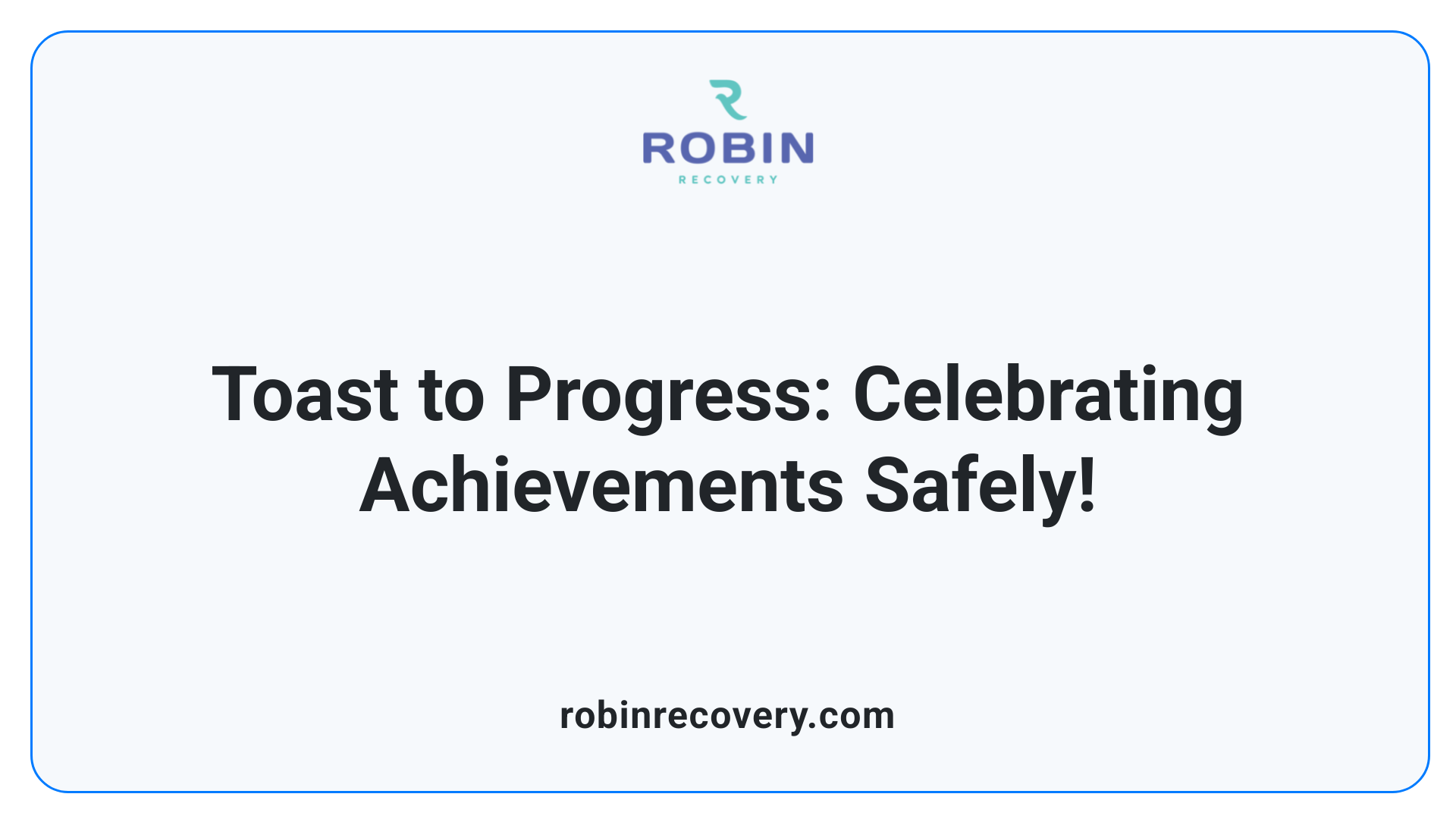The importance of celebrating personal growth during recovery

Understanding the Power of Celebrations in Recovery
Recovery from addiction is an ongoing journey marked by challenges, triumphs, and significant milestones. Celebrating personal growth during this process is not merely about commemorating days of sobriety but is a powerful strategy that reinforces self-esteem, motivation, and resilience. This article explores how honoring recovery achievements can profoundly impact an individual's healing and mental health, offering insights into effective strategies for embracing these vital moments.
The Role of Milestone Celebrations in Recovery

Boosting self-esteem through recovery milestones
Celebrating recovery milestones plays a significant role in enhancing self-esteem and confidence. When individuals acknowledge their achievements, whether large or small, they gain a better understanding of their personal worth beyond addiction. This recognition facilitates an improvement in self-perception and skills mastery, both essential components for long-term recovery success.
Importance of celebrating both small and large milestones
Every milestone serves as a motivating factor, pushing individuals to continue their positive changes. From regular therapy attendance to reclaiming employment, these accomplishments act as tangible evidence of progress. Celebrating milestones not only reinforces commitment to sobriety but also instills a sense of accomplishment that motivates continued growth in recovery. Furthermore, the act of acknowledging smaller wins creates momentum, which is integral for sustaining motivation throughout the recovery journey.
Community support through shared celebrations
Milestone celebrations also contribute to building strong support networks. Sharing these achievements with loved ones and peers in recovery creates a sense of community and reduces feelings of isolation. This communal aspect is particularly vital for individuals early in their sobriety, as they are often at a higher risk for relapse. By fostering connections and encouraging one another through celebrations, individuals solidify their commitment to recovery, reinforcing the belief that they are capable of overcoming the challenges associated with addiction.
Emotional Benefits of Celebrating Recovery Milestones
Improved Mental Health Through Celebration
Celebrating recovery milestones plays a significant role in enhancing mental health. Acknowledgment of achievements, whether big or small, fosters a sense of accomplishment that directly boosts self-esteem and confidence. This recognition serves as evidence of progress, motivating individuals to continue making positive changes. When individuals see milestones as markers of growth, they are more likely to feel empowered to pursue their recovery goals.
Furthermore, celebrating milestones encourages the development of a positive self-image by disrupting negative self-stigma. This shift in perception can significantly improve a person’s willingness to engage in their recovery process.
Developing Emotional Resilience
The act of celebrating milestones contributes to building emotional resilience vital for managing life’s challenges. Recognizing personal achievements helps individuals learn to cope with stressors without reverting to harmful behaviors. As they reflect on their journey, they become more adept at identifying triggers and develop healthier coping strategies. This emotional growth is crucial not just for maintaining sobriety but for healing relationships and restoring personal integrity damaged by addiction.
Gratitude Practices as Part of Celebrations
Integrating gratitude practices into celebratory moments enhances their emotional benefits. Gratitude routines encourage individuals to focus on the positive aspects of their recovery journey, promoting feelings of happiness and motivation. By reflecting on what they are grateful for, individuals reinforce their self-worth, paving the way for a more optimistic outlook on their future. This sense of gratitude not only nurtures emotional resilience but also strengthens community ties, creating a supportive network essential for long-term recovery.
Celebrating milestones, therefore, is not merely a reflection of progress but a transformative practice that sustains mental health and fosters personal growth.
Leveraging Self-Care as a Recovery Tool
What is the importance of self-care in recovery?
Self-care is vitally important in addiction recovery as it encompasses the physical, emotional, and mental health of individuals. Engaging in practices such as mindful eating and regular exercise enhances overall well-being.
To foster a supportive environment for lasting sobriety, individuals can also nurture social connections. Identifying and managing triggers, including negative emotions and high-risk situations, is essential to prevent relapse. This requires a strong sense of self-awareness, which is a crucial component of effective self-care.
Therapeutic activities like meditation and creative expression can significantly help manage stress. These practices contribute to improved emotional regulation, offering individuals the tools necessary to navigate challenges effectively.
Integrating self-care into recovery routines
Integrating self-care into daily routines establishes a structured approach to recovery. Simple strategies can include setting aside time for leisure activities, maintaining a balanced diet, and prioritizing exercise. Individuals may also find it beneficial to practice mindfulness techniques, like deep-breathing exercises, that help ground them in the present moment.
Long-term benefits of prioritizing self-care
The long-term benefits of prioritizing self-care extend far beyond immediate well-being. Continuous self-care practices foster resilience and personal growth. As individuals gain confidence in their ability to manage stress and cravings, they become more equipped to maintain sobriety and achieve personal goals.
In summary, self-care not only nurtures immediate health but builds a foundation for sustained recovery, enabling individuals to forge meaningful connections and build a fulfilling life beyond addiction.
Incorporating Fun and Enjoyment into Recovery
What role does having fun play in the recovery process?
Having fun plays a crucial role in the recovery process by providing individuals with a sense of accomplishment and reducing stress. These factors are essential for maintaining sobriety over time. Engaging in enjoyable activities helps individuals replace the perceived fun of substance use with fulfilling experiences, reinforcing the motivation to remain in recovery.
Moreover, studies highlight the significance of re-engaging in activities that were once enjoyable. A lack of enjoyment can lead to boredom, which can increase the risk of relapse. By pursuing enjoyable hobbies, individuals can foster a sense of purpose and joy in their lives, thus making recovery more sustainable.
Substituting past harmful habits with enjoyable activities
Replacing harmful habits with positive, enjoyable activities is fundamental in recovery. This substitution not only distracts from urges but also fills the time previously consumed by substance use with rewarding experiences. New hobbies, exercise, or social engagements can help cultivate a fulfilling and balanced lifestyle.
Importance of enjoyment in preventing relapse
Enjoyable activities are a key aspect of self-care that helps address emotional distress. When individuals find joy in daily life, they are less likely to revert to harmful coping mechanisms. Building a routine that incorporates fun activities enhances overall well-being and fosters personal growth, making it easier to navigate challenges that arise during recovery.
Connecting with past hobbies as a form of self-care
Reconnecting with past hobbies can serve as an effective form of self-care. This approach not only allows individuals to enjoy something familiar but also aids in rebuilding a positive self-image. Engaging in activities that once brought joy can rekindle feelings of competence and mastery, which are crucial for personal growth in recovery.
Embracing enjoyment during recovery not only supports the healing journey but also strengthens resilience against potential triggers, fostering long-lasting well-being and sobriety.
The Importance of Setting and Celebrating SMART Goals

Goal Setting Strategies in Recovery Plans
Setting SMART goals—Specific, Measurable, Achievable, Relevant, and Time-bound—is crucial for individuals in recovery. This structured approach helps define clear objectives that guide the recovery journey, whether they relate to sobriety, personal development, or repairing relationships. By establishing short-term and long-term goals, individuals gain a sense of direction and purpose that reinforces their commitment to change.
Impact of Achieving Personal Goals on Self-Esteem
Accomplishing set goals significantly boosts self-esteem and confidence. Each milestone achieved serves as evidence of progress, fostering a positive self-image and reinforcing an individual’s belief in their ability to overcome challenges associated with addiction. Celebrating these achievements, no matter how small, allows for reflection on the journey and strengthens resolve for future endeavors.
Steps to Personalize Celebration of Achievements
Personalizing celebrations makes them meaningful and impactful. Here are some simple strategies:
- Journaling: Reflect on challenges faced and progress made.
- Self-Care Activities: Indulge in enjoyable activities to reward oneself.
- Sharing Success: Connect with supportive loved ones or groups to share achievements.
By incorporating these personalized celebrations into recovery plans, individuals can maintain motivation and reinforce the importance of their growth and dedication.
What is the significance of routine in recovery?
The significance of routine in recovery lies in its ability to provide structure and predictability during a time of significant life changes. Establishing daily patterns helps prioritize healthier habits, support emotional well-being, and reduce feelings of restlessness and boredom that can hinder recovery efforts. Consistent routines encourage self-care and personal time, essential for emotional health. Ultimately, a structured routine serves as a foundation, offering security and purpose that enhances sobriety and overall recovery success.
Building a Support Network through Celebrations

Community and Peer Support in Recovery
Building a strong support network is crucial for individuals in recovery. Celebrating milestones fosters a sense of community, allowing people to share achievements and feelings. These communal celebrations create connections among peers, reinforcing commitment to sobriety.
Methods to Safely Celebrate Milestones
To ensure that celebrations remain safe and positive, it’s important to plan carefully. Here are several strategies to consider:
- Hold Events in Safe Spaces: Choose locations that are supportive and free from relapse triggers.
- Involve Non-Triggering Activities: Engage in activities that promote wellness and positivity.
- Brainstorm with Support Groups: Collaborate with a support group to gather ideas for celebrations that align with recovery goals.
- Focus on Gratitude: Incorporate gratitude practices during celebrations to reinforce positive emotions.
Reinforcing Positive Behaviors through Group Recognition
Group recognition nurtures self-esteem and motivation within a recovery context. When achievements are celebrated collectively, individuals feel validated and encouraged to continue their journey. Celebrating together not only reinforces positive behavior but also helps build trust and connection among those navigating similar challenges. This supportive network is critical in maintaining motivation and fostering resilience, enhancing the overall recovery experience.
Toasting to Individual Achievements Safely

Aligning Celebration Activities with Personal Values
When celebrating recovery milestones, it's crucial to align your activities with your personal values. This alignment ensures that the celebration feels meaningful and intentional. For example, someone who values creativity might choose to commemorate their accomplishments through art or writing. Another person may prefer acts of kindness, focusing their celebration on helping others, which can also provide a sense of fulfillment.
Ideas for Healthy Celebrations
Healthy celebrations can include a variety of activities that enhance well-being while avoiding potential triggers. Consider the following ideas:
- Nature Outings: Organize a hike or a picnic in a park with supportive friends.
- Wellness Days: Treat yourself to a day of self-care, such as a spa visit or a yoga class.
- Creative Projects: Dive into a new hobby, like pottery or painting, which provides a healthy outlet for emotions.
Creating Meaningful Personal Rituals
Developing personal rituals can enhance the significance of celebrating achievements. For example:
- Journaling: Reflect on your journey in a journal, noting emotions and insights gained.
- Gratitude Rituals: Set aside time to express gratitude for your progress, either privately or in a supportive group.
- Milestone Tokens: Create a physical representation of your achievement—like a bead for a bracelet—to visually mark each milestone.
Celebrating these milestones safely and meaningfully reinforces your commitment to growth and encourages continued progress on your recovery journey.
Embracing Growth, One Step at a Time
Celebrating personal growth during recovery offers more than just a reason to rejoice—it is a testament to one’s resilience, determination, and readiness to embrace a life of sobriety. Each milestone signifies a cessation of old habits and the embrace of healthier ones. By celebrating these victories, individuals rebuild self-esteem, strengthen support systems, and perpetuate a cycle of positive behavior. This, in turn, transforms the arduous journey of recovery into a hopeful adventure brimming with opportunities for personal growth and fulfillment. As such, it becomes vital to recognize and honor these milestones, fostering an enduring commitment to a healthy, empowered life.
References
The Importance of Personal Growth in Addiction Recovery
Understanding the Value of Celebrating Recovery Milestones
Personal Growth in Recovery: Setting and Achieving New Goals
